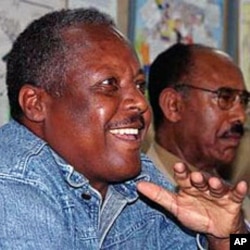The EPRDF-led government says it has implemented a code of conduct that establishes a level playing field for all parties in the upcoming elections. The code gives all participating parties airtime for campaigning and commits all signatories to resolve disputes amicably – and without public protests.
Over 150 international observers will monitor the polls, which also elect state legislatures. Most observers will come from the European Union, which also sent a team in 2005.
EPRDF spokesman Sekou Toure states the observers and code of conduct answer the concerns of the opposition parties and the international community.
“This strategy focuses on making the elections free, fair and peaceful," says Toure.
"In addition to that, we want to make the elections legitimate and for the Ethiopian people to take the government that comes out of those elections as legitimate.”
In the previous polls of 2005, the opposition accused the EPRDF of rigging the elections in their favor, but Toure states the voting was transparent but the opposition failed to accept defeat.
"The EPRDF worked hard to make the elections as free and fair as possible," he says.
"After the election day, the opposition parties gained a lot of seats in the regional parliament and the Addis Ababa city council but they weren’t willing to accept the majority decision of the people."
Not everyone agrees.
Some observers say the army suppressed protestors who disputed the official results showing the ruling party in the lead.
Merera Gudina is a leading figure in the Ethiopian opposition and one of the authors of the book Hot Spot: Horn of Africa Revisited, a collection of academic works focusing on the Horn. He terms the army intervention "state-sponsored, systematic and widespread" as thousands of opposition members and supporters were jailed.
He says the vote was unfair in other ways as well. Gudina says the government maintained tight control over the media, and the national electoral board was not neutral, but appointed by the Prime Minister, Meles Zenawi.
According to Gudina, in the upcoming elections the national electoral board is again closely allied to the ruling party. The electoral body asked all political parties to submit election-related grievances ten days ago, but Gudina says his complaints of harrassment and other irregularities have not been addressed.
"There is no doubt that we can win if the elections are free and fair," he says of his opposition coalition.
Monika Sommer is an associate researcher at the African Studies Centre at Oxford University and an expert in Ethiopian studies. She is also the co-editor of the Hot Spot book of political essays. She says some progress has been made, but the process remains too centralized.
“The grass roots -- rural people -- continue to be ignored. The 2005 elections were seen as the first free elections that really took place in Ethiopia, but this was already hampered. What followed was a huge degree of violence and arrests of opposing politicians," says Sommer.
She says the Ethiopian constitution leaves a lot of decision-making to the regions, but that’s not the case today.
“In reality," she says, "everything is handled in a very centralized manner through party lines. This means regionally appointed officials do not have much power as the main power resides with the central government in Addis Ababa. Much of the authority to govern those regions remains with the central government, and this of course played a role in the elections.”
Sommer says restrictions on the press and on the public criticism of the government makes it difficult for people to openly discuss issues or voice their opinions. This needs to change, she says, if the May polls are to be free and fair.
Additional reporting by Jackson Mvunganyi








